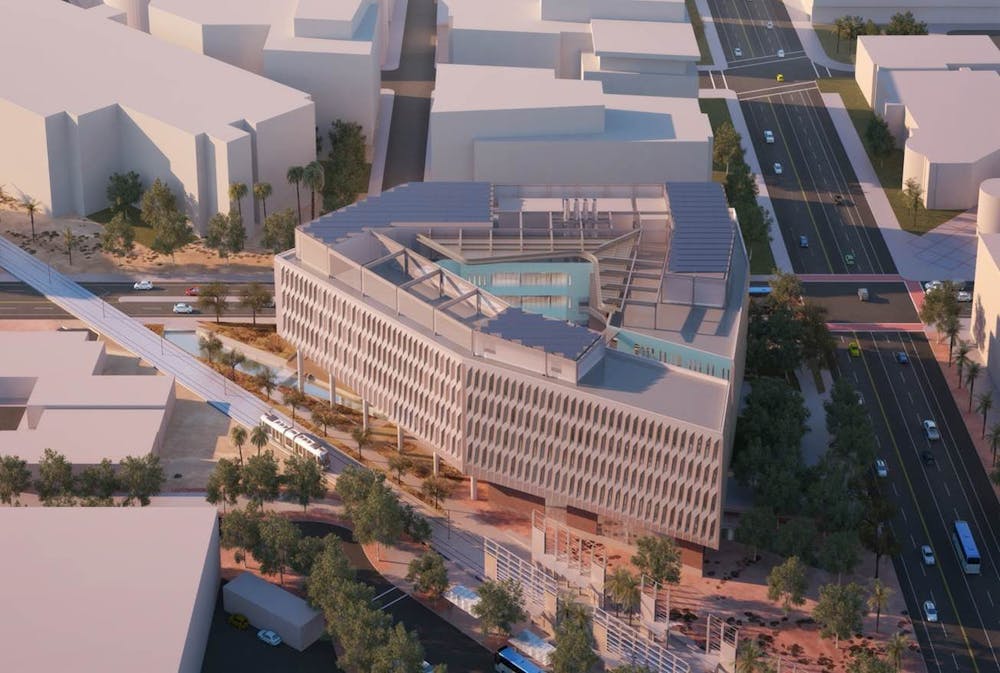ASU's Julie Ann Wrigley Global Futures Laboratory has launched but must wait for the completion of its building, Interdisciplinary Science and Technology 7.
The new building, which is expected to open in December 2021, will bring together the new College of Global Futures and several programs dedicated to creating a sustainable future.
The Global Futures Laboratory aims to take an interdisciplinary approach to the future of the planet in a humanities-based direction.
The lab is being spearheaded by Peter Schlosser, vice president and vice provost of the Global Futures Initiative. Schlosser is an expert Earth scientist and has spent his career studying the planet in the evolving field of sustainability.
According to Schlosser, the first step toward the creation of the lab came in 2004 with the founding of the Global Institute of Sustainability and Innovation. Two years after its establishment, ASU went on to create the School of Sustainability, the first program of its kind in the nation, according to Schlosser.
A few years after the creation of the Rob and Melani Walton Sustainability Fellowship Program, University President Michael Crow sought to expand all of these programs all together under one roof, leading to the creation of the Global Futures Laboratory and ISTB7.
Schlosser came to ASU in January 2018 and has been working to execute this vision and help it evolve.
“I was thinking about what the next step could be in the evolution of ASU’s prominent presence in sustainability," Schlosser said. "It occurred to me that what we are really after is figuring out what kind of options we have to shape our future, this has to be something global.”
According to Schlosser, the new lab will have five distinct functions — spaces for learning, discovery, solutions, networking and engagement.
The laboratory’s learning space will be anchored by the College of Global Futures, which encompasses the School for the Future of Innovation in Society, the School of Sustainability and the new School of Complex Adaptive Systems.
The discovery space will be dedicated to research, anchored by the Global Institute of Sustainability and Innovation.
According to Deputy Director of the Global Institute of Sustainability and Innovation Dave White, the lab will house about two dozen separate research centers for the institute.
White said the research centers will “focus on a variety of topics such as water sustainability, urban sustainability, agriculture and the future of agriculture.”
In addition to managing the institute, White also leads a research center within the Global Futures Laboratory called the Decision Center for a Desert City. This research center focuses on water systems in urban areas within the Colorado River basin.
The remaining three spaces will focus on global outreach, collaboration and widespread education.
According to Dave Guston, director of the School for the Future of Innovation in Society and associate vice provost for discovery, engagement and outcomes; there are already a number of projects in the works that reflect these missions.
Guston said one example is a project by Klaus Lackner, who has spent the last few years at ASU developing mechanical trees, one of the most promising examples of carbon-capturing technology.
Though based at ASU, Lackner’s work is part of a global effort to reduce the amount of carbon in our atmosphere.
“ASU is a lead part of a new consortium called the new carbon economy consortium,” Guston said. “This is a dozen or so universities that are attempting to understand how one can turn carbon capture into a self-sustaining economic force,”
This is one of the many globally-based research projects that will be housed in the new laboratory. To Schlosser, the "future" aspect of the Global Futures Lab is most important.
“The young generation has a big impact on how we think about where we put our effort,” Schlosser said. "I see it as a big part of my task to enable young people to find their own space, a space that is different from the one I went through.”
Reach the reporter at mbortega@asu.edu and follow @Marixortega on Twitter.
Like The State Press on Facebook and follow @statepress on Twitter.




